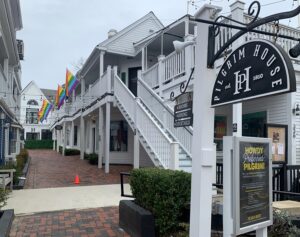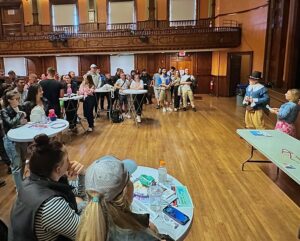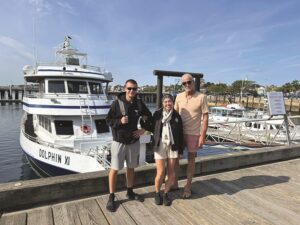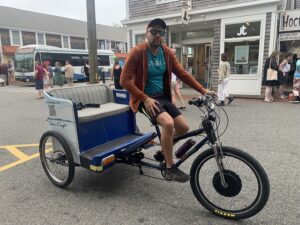PROVINCETOWN — At one of Provincetown’s premier drag performance spaces this season, the lights and lineup have dimmed. The Pilgrim House, a hotel and entertainment venue, used to host “three shows a day, six days a week” during the high season, co-manager Ken Horgan told the Independent. This year there’s been about one show every three days, he said.

At least 12 entertainers slated to perform during the Pilgrim House’s 2025 season have taken their talents elsewhere, Horgan has said in court filings, including Miss Conception, Peaches Christ, and Hedda Lettuce.
At an establishment where entertainment alone typically brings in $1 million in revenue, “we’ll be lucky if we land about $200,000,” he said.
In court filings in Puerto Rico, Horgan alleges that a co-owner of the hotel, Maria Cirino, warned those performers last winter about problems at the Pilgrim House — statements that his lawsuit contends were defamatory and for which he seeks damages.
Other lawsuits filed by vendors and business partners in Massachusetts, California, Puerto Rico, and the United Kingdom allege that Horgan and his husband, Kevin Scott Bente, who also own the Kenneth Scott and Henry & Company clothing stores in Provincetown, neglected to pay their creditors.
Since 2017, Cirino and her partner, Elizabeth Barbeau, have co-owned the Pilgrim House with Horgan and Bente, who are responsible for its day-to-day operations. In a Barnstable Superior Court lawsuit filed on May 15, the women claimed that the men misappropriated over $358,000 from the hotel’s accounts to spend on their other businesses and personal expenses.
A subsequent filing by Cirino on June 20 upped that number to $507,000.
Meanwhile, six unpaid wage complaints have been filed against the Pilgrim House at the Fair Labor Division of the Mass. attorney general’s office since 2021 — more than any other business on the Outer Cape.
Although the names of the complainants are being withheld by the attorney general’s office, nine former workers and performers at the Pilgrim House told the Independent they had received their paychecks late or were improperly paid.
Jeremy Perkins, who worked at the Pilgrim House in 2023 and 2024, said that payroll errors were routine, including improperly paid overtime and shifts that were “deleted” from timesheets. “There was a lack of responsibility from anyone in management,” Perkins told the Independent.
A former entertainment director at the hotel, John Pirroni, said that in 2022 he flagged billing discrepancies involving contractors and staff, but that Horgan “would disappear when it was time to pay up.”
Matt W. Cody, an actor, was hired in 2021 on a weekly stipend to develop and perform puppet shows with the “Madame” puppet at the hotel. He ended that partnership after alleged pay discrepancies and what he described as “bullying” by Horgan.
Joe Kovacs, a puppeteer who was hired to fill Cody’s role the following year, told the Independent that he “went all summer without getting paid.”
Kovacs said he eventually received $24,000 in back pay in late 2022 but stopped working at the Pilgrim House in 2023 because of additional pay issues.
Horgan categorically denied claims of financial misconduct in an interview with the Independent on July 20.
Business Matters
Cirino’s June 20 filing in Barnstable Superior Court alleges that at least $507,000 from the Pilgrim House’s bank account has been spent on matters unrelated to the hotel — including legal fees involving the Madame puppet and expenses at another business owned by Horgan and Bente in Palm Springs, Calif. About $214,000 in unidentified cash withdrawals, wire transfers, and credit card payments are still unaccounted for, her lawsuit claims.

A Barnstable County judge had ordered Horgan and Bente to release all the hotel’s bank statements to the court by June 6, which according to Cirino’s June 20 filing did not happen. A hearing connected to those bank statements is now scheduled for Aug. 12.
In another suit filed in Puerto Rico on Feb. 14, Cirino refers to an agreement about the rights to sell the Pilgrim House. In those filings, she claims that Horgan and Bente had agreed to transfer “full decision-making authority” to sell the Pilgrim House to her in exchange for a $220,000 loan in 2023. Since they did not repay the loan, she is owed a 5-percent share of the company that will give her and Barbeau majority ownership, according to her filings.
The owners received a $4.5-million offer to buy the property last December, but Horgan rejected it, the lawsuit says.
Horgan has countersued Cirino in Puerto Rico for defamation and tortious interference.
Cirino declined to speak about these lawsuits to the Independent. “No one wants more for this story to come out than me,” she said on the phone before ending the call. “On the advice of my counsel, I cannot engage with you at all.”
In response to emailed questions, Cirino wrote that she had not been aware of wage complaints from employees of the Pilgrim House until very recently.
“I had no knowledge, nor was I aware of these complaints,” she wrote. “As you are aware, I’m requesting assistance from the courts in an effort to correct Pilgrim House issues that I have been discovering over the last 12 months.”
According to her court filings in Puerto Rico, Cirino originally learned of financial woes at the Pilgrim House when Seamen’s Bank notified her of a potential foreclosure last August due to missed payments.
The state Dept. of Revenue also seized her personal tax refund of $35,786 in February to apply to state and local room occupancy taxes that had not been properly paid, according to her filings.
Wage Complaints
The state attorney general’s office released the six wage complaints filed against the Pilgrim House to the Independent but redacted the names and job titles of the workers who filed them.
The text of the complaints indicates that one was filed by a worker disputing vacation pay in July 2021; two were filed by hourly workers in August 2023; another was filed by a tipped hourly worker in August 2023; one was filed by an hourly worker in July 2024; and the sixth was filed by a tipped hourly worker in November 2024.
The complaints allege weeks or months of late payments.
“I have been waiting for this for over a month already. Almost every time the paycheck is not on time,” says one of the August 2023 complaints. “We barely survived this month.”
“The owners Ken Horgan and Scott Bente continuously were late paying employees, deducted hours from employees’ time sheets, and some never got paid,” reads the July 2024 complaint. “Most all of our entertainment staff (contract) were paid late. This is something that has been going on for years.”
“I never received the whole amount owed to me,” says the November 2024 complaint.
Horgan told the Independent the wage complaints were meritless. “Not once was it found that I owed anyone anything,” he said.
According to correspondence from the attorney general’s office, it did not investigate most of the complaints. Instead, the people who filed them were sent “private right of action letters” in which the office wrote that “The Fair Labor Division receives and reviews thousands of complaints each year and must make difficult decisions about which cases it will pursue on the worker’s behalf. We have reviewed your complaint and have decided not to investigate your complaint further. This is not a determination of the merits of your case. It does mean, however, that this office will not be taking any further action on your complaint.”
In one of the complaints from 2024, however, an investigator in the attorney general’s office named Iona Powell-Headley emailed Horgan and another manager at the Pilgrim House to ensure that a complainant’s final paychecks were correctly issued and mailed.
J-1 Troubles
In May 2023, a group of six J-1 students — friends from the Bulgarian city of Plovdiv — arrived in Provincetown to work at the Pilgrim House. To the group, the summer work seemed promising: “The difference in the money you make there and back home is crazy,” said one student who asked for anonymity in case he wants to work in Provincetown again in the future. But the students also experienced missing or delayed paychecks, including as much as $200 in missing tips per week, he said.
“These kids would work for me during the day at the clothing store and then work at night at the Pilgrim House in the restaurant,” said Matthew Phipps Hines, a manager at Kenneth Scott and Henry & Company in 2023. “They noticed that they weren’t getting their tips, and then they weren’t getting paid at all,” he said.
The group filed a complaint with their State Dept. sponsor organization, Intrax, about the discrepancies, the student said.
“The concerns reported to us in 2023 were regarding paychecks, and we advocated on behalf of the students to the host company to resolve the concerns,” Janice Fox, field operations director at Intrax, told the Independent.
Intrax has not placed any J-1 students in jobs at the Pilgrim House since 2023, Fox said.
“I think this all matters because there’s only so many venues in town for drag performers,” said Pirroni, who performs as Delta Miles. Numerous working people have stories of “their money and their time being tampered with. When you pay people late, that can be catastrophic for them,” he said.
“I don’t think anyone is asking for anything other than being treated fairly,” Pirroni said. “When you start screwing around with people’s money and ultimately their security, that shows a true lack of respect.”
Editor’s note: An earlier version of this article, published in print on July 24, incorrectly referred to a business in Palm Springs, Calif. owned by Ken Horgan and Kevin Scott Bente as a hotel. The business, Zoso Operations LLC, was located at a hotel but they did not own the hotel.





